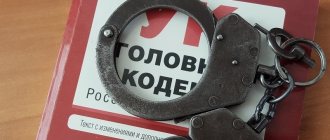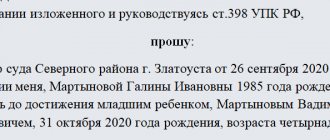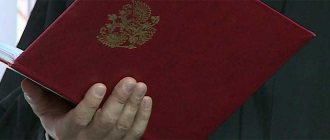New edition of Art. 221 Code of Criminal Procedure of the Russian Federation
1. The prosecutor reviews the criminal case with the indictment received from the investigator and, within 10 days, makes one of the following decisions on it:
1) on approval of the indictment and on sending the criminal case to court;
2) on the return of the criminal case to the investigator for additional investigation, changing the scope of the charge or qualification of the actions of the accused or restating the indictment and eliminating identified deficiencies with their written instructions;
3) on sending the criminal case to a higher prosecutor for approval of the indictment, if it is within the jurisdiction of a higher court.
1.1. In case of complexity or large volume of the criminal case, the period established by part one of this article may be extended at the motivated request of the prosecutor by a higher prosecutor up to 30 days.
2. Having established that the investigator violated the requirements of part five of Article 109 of this Code, and the deadline for keeping the accused in custody has expired, the prosecutor cancels this preventive measure.
2.1. Having established that the period of prohibition of certain actions provided for in paragraph 1 of part six of Article 105.1 of this Code, the period of house arrest or the period of detention turns out to be insufficient for making a decision in the manner established by this article, or for the court to fulfill the requirements provided for in part three of Article 227 of this Code, the prosecutor, if there are grounds, files a petition with the court to extend the period of these preventive measures.
3. In the cases provided for in paragraphs 2 and 3 of part one of this article, the prosecutor issues a reasoned decision.
4. The prosecutor’s decision to return the criminal case to the investigator may be appealed by him within 72 hours from the moment the criminal case was received by him with the consent of the head of the investigative body to a higher prosecutor, and if he disagrees with his decision - to the Prosecutor General of the Russian Federation with the consent of the Chairman of the Investigative Committee of the Russian Federation or the head of the investigative body of the relevant federal executive body (under the federal executive body). The superior prosecutor, within 10 days from the receipt of the relevant materials, makes one of the following decisions:
1) to refuse to satisfy the investigator’s request;
2) to cancel the decision of the lower prosecutor. In this case, the superior prosecutor approves the indictment and sends the criminal case to court.
5. An appeal against the decision of the prosecutor specified in paragraph 2 of part one of this article, in the manner established by part four of this article, suspends its execution.
Commentary on Article 221 of the Code of Criminal Procedure of the Russian Federation
1. As a general rule, the prosecutor is given ten days to resolve this list of issues and make a decision on them.
2. The petitions referred to in parts 1.1 and 2.1 of the commented article are recommended to be drawn up in the form of a resolution to initiate a petition to extend the period for consideration of a criminal case with an indictment (house arrest or period of detention).
3. In the prosecutor’s resolution on the indictment, in addition to the phrase “I approve,” the position, special rank, surname and initials of the prosecutor must be indicated.
4. As a general rule, the prosecutor, returning a criminal case for additional investigation, does not have the right to prejudge the issues of proof of the charge, the reliability of this or that evidence and the superiority of some evidence over others, as well as consider established circumstances that are subject to verification during the preliminary investigation.
5. When returning the case for additional investigation, the prosecutor has the right to make representations to the head of the investigative body both regarding the violation of the criminal procedural law, which led to the return of the case for additional investigation, and upon discovery of other violations of the law and the rights of citizens committed during the preliminary investigation.
6. The shortcomings (clause 2 of part 1 of the commented article) here mean violations of not only the criminal procedural law, but also the norms of morality. It is unacceptable, for example, where this can be avoided, to state in the indictment verbatim obscene language, the utterance of which accompanied the commission of a crime, etc.
7. When approving an indictment or a resolution to send the case to court for the application of compulsory medical measures, the prosecutor is obliged to check the presence in the case of documents that reflect the location of material evidence, objects and valuables seized in the case <1307>. ——————————— <1307> See: Instructions on the procedure for the seizure, recording and storage and transfer of material evidence in criminal cases, valuables and other property by preliminary investigation bodies, inquiries and courts dated October 18, 1989. N 34/15.
8. The prosecutor is deprived of the opportunity to independently draw up a new indictment. This power is the prerogative of the preliminary investigation body.
9. The prosecutor has the right to return a criminal case for additional investigation, change the scope of the charge or qualification of the actions of the accused even when it is necessary to change the charge to a more serious one or one that differs significantly in factual circumstances from the original charge.
10. An accusation that is associated with the imputation of a crime of a different kind or a change in the wording of the accusation that violates the right of the accused to defense should be considered significantly different from the original one in factual circumstances.
11. On the grounds for changing or canceling a preventive measure, see: commentary to Art. 110 Code of Criminal Procedure of Russia.
12. See also: commentary to Art. Art. 24 - 28, , 97, 99, 162, 171, 175, 220, 230, 237 Code of Criminal Procedure of Russia.
Everything about criminal cases
Go to the text of the Code of Criminal Procedure
Url Additional information:
Prosecutor's decision in the case
— Part 1 221 Code of Criminal Procedure
a case received from an investigator is considered within 10 days
- Part 1.1 221 Code of Criminal Procedure
for complex, voluminous cases in 30 days
I).
Confirmation of the indictment
- Clause 1 Part 1 221 Code of Criminal Procedure
the prosecutor approves the conclusion and sends the case to court
II).
Returning the case to the investigator
— Clause 2 Part 1 221 Code of Criminal Procedure
return case:
— Clause 2 Part 1 221 Code of Criminal Procedure
return of the case for additional investigation
— Clause 2 Part 1 221 Code of Criminal Procedure
return of the case to change the scope of the charge
— Clause 2 Part 1 221 Code of Criminal Procedure
return of the case for re-drafting the conclusion
- Part 3 221 Code of Criminal Procedure
a reasoned decision is issued to return the case
III).
Referral of the case to a higher prosecutor
— Clause 3 Part 1 221 Code of Criminal Procedure
the prosecutor sends it to a superior if the jurisdiction is higher
Detention
- Part 2 221 Code of Criminal Procedure
the prosecutor releases after the expiration of the maximum period of custody
- Part 2.1 221 Code of Criminal Procedure
the prosecutor provides the court with an extension of the period of custody
Appealing the return of the case
- Part 4 221 Code of Criminal Procedure
the investigator will appeal to a higher prosecutor within 72 hours
- Part 4 221 Code of Criminal Procedure
the investigator will then appeal to the Prosecutor General
- Part 4 221 Code of Criminal Procedure
superior prosecutor within 10 days:
— clause 1 part 4 221 Code of Criminal Procedure
refuses to satisfy the investigator's request
— clause 2, part 4, 221 Code of Criminal Procedure
cancels the decision of the lower prosecutor
- Part 5 221 Code of Criminal Procedure
appeal suspends execution
Article 221 of the Code of Criminal Procedure. Prosecutor's decision in a criminal case
1) The prosecutor reviews the criminal case received from the investigator with an indictment,
- and within 10 days makes one of the following decisions on it:
Url Additional information:
— P.14
Plenum No. 28, a case not approved by the prosecutor is returned by the court
1). on approval of the indictment and on sending the criminal case to court;
Url Additional information:
- clause 15 part 2 37 Code of Criminal Procedure
the prosecutor has the right to return the case with written instructions
- Part 6.1 162 Code of Criminal Procedure
investigation period when the case is returned by the prosecutor: 1 month
- clause 3.1
Plenum No. 1, the return of the case to the investigator is not appealed under
Article 125 of the Code of Criminal Procedure
2). on the return of the criminal case to the investigator for:
— conducting an additional investigation;
Url Additional information:
- part 1 175 of the Code of Criminal Procedure
change of charge
— changes in the scope of charges or qualifications of the actions of the accused;
- or restate the indictment and eliminate the identified deficiencies with their written instructions;
3).
on sending a criminal case to a higher prosecutor for approval of the indictment, if it is within the jurisdiction of a higher court.
1.1) In case of complexity or large volume of the criminal case, the period established by part 1 of this article may be extended at the motivated request of the prosecutor by a higher prosecutor up to 30 days.
2) Having established that the investigator violated the requirements of Part 5 109 of the Code of Criminal Procedure, and the deadline for keeping the accused in custody has expired, the prosecutor cancels this preventive measure.
Url Additional information:
- Part 8.3 109 Code of Criminal Procedure
in the case provided for in
Part 2.1 221 of the Code of Criminal Procedure
, extension for 30 days
— paragraph 31
Plenum No. 41 extension of preventive measures when transferring a case to court
2.1) Having established that the period of prohibition of certain actions provided for in paragraph 1 of Part 6 of 105.1 of the Code of Criminal Procedure, the period of house arrest or the period of detention is insufficient for making a decision in the manner established by this article, or for the court to fulfill the requirements provided for in Part 3 227 of the Code of Criminal Procedure, the prosecutor, if there are grounds, initiates a petition before the court to extend the period of these preventive measures
.
3) In the cases provided for in paragraph 2, paragraph 3 of part 1 of this article, the prosecutor issues a reasoned decision.
Url Additional information:
- clause 5 part 2 38 Code of Criminal Procedure
the investigator's right to appeal the return of the case from the prosecutor
- clause 10 part 1 39 Code of Criminal Procedure
consent of the head of the investigation office to appeal the return of the case
- Part 3 162 Code of Criminal Procedure
The time for appeal is not included in the investigation period
4) The prosecutor’s decision to return the criminal case to the investigator may be appealed by him within 72 hours from the moment the criminal case was received by him, with the consent of the head of the investigative body - to a
higher prosecutor,
and in case of disagreement with his decision - to the Prosecutor General with the consent of the Chairman of the Investigative Committee or the head of the investigative body of the relevant federal executive body (under the federal executive body).
The superior prosecutor, within 10 days from the receipt of the relevant materials, makes one of the following decisions:
1). on refusal to satisfy the investigator's request;
2). to cancel the decision of the lower prosecutor. In this case, the superior prosecutor approves the indictment and sends the criminal case to court.
5) An appeal of the prosecutor’s decision specified in clause 2 of part 1 of this article, in the manner established by part 4 of this article, suspends its execution.
Return to the text of the Code of Criminal Procedure
Seek advice
Commentary on Article 221 of the Civil Code of the Russian Federation
1. Almost immediately after the entry into force of the first part of the Civil Code, the Law on Animal World was adopted. It established that “the animal world within the territory of the Russian Federation is state property” (Article 4).
2. The law comprehensively regulates almost the entire range of relations related to the animal world. It states that the distinction between federal ownership of wildlife and the property of constituent entities of the Russian Federation is established by federal law. Objects of the animal world that are rare and endangered, as well as those listed in the Red Book of the Russian Federation, may be considered federal property; objects of the animal world that naturally migrate across the territory of two or more constituent entities of the Russian Federation, etc. The exception is aquatic biological resources: fish, aquatic invertebrates, aquatic mammals, algae, other aquatic animals and plants in a state of natural freedom. Ownership of them is regulated by Federal Law dated December 20, 2004 N 166-FZ “On Fisheries and Conservation of Aquatic Biological Resources” (as amended on December 31, 2005) <1>.
——————————— <1> NW RF. 2004. N 52 (part 1). Art. 5270; 2006. N 1. Art. 10.
This Law establishes that legal entities use wildlife on the basis of a license for a specified period and within a certain territory (water area). The licensing procedure is also established for citizens: they carry out use on the basis of registered one-time licenses for the extraction of a certain number of objects of the animal world in a certain place (or for a certain period).
The law distinguishes between two types of use: those carried out through the removal of objects of the animal world from the habitat and those occurring without such removal.
3. The Law on Animal World assigns civil law norms a subsidiary role in regulating relations related to the animal world. It establishes: “The rules of civil law relating to property apply to objects of the animal world. are applied to the extent that this is permitted by this federal law and other federal laws” (Article 4). This Law resolves the issue of acquiring property rights without reference to the commented article. It establishes that “users of the animal world have the right of ownership to the obtained objects of the animal world and the products obtained from them” (Article 40).
The Law “On Fisheries and Conservation of Aquatic Biological Resources” established that aquatic biological resources are federal property, with the exception of those that live in separate water bodies. The latter can be not only federal property, but also the property of constituent entities of the Russian Federation, as well as municipal and private property (Article 10).
4. In accordance with the Law, a group of by-laws dedicated to the use of wildlife is being formed. These acts lie outside the scope of civil law and are left without comment.
Russia is also a party to a number of international treaties on wildlife issues, including the multilateral Convention on Biological Diversity, signed in Rio de Janeiro in 1992. The Wildlife Law establishes that objects of wildlife that fall under subject to international treaties of the Russian Federation (Article 4).
5. The commented article applies to berries and other publicly available things that are not objects of the animal world. It requires that their ownership be established on a legal basis. The acquisition of property rights is permitted only if the collection and extraction of the relevant objects have been permitted. Three sources of permitting standards are indicated. First of all, this is the law. If we compare this rule with the more general rule contained in Art. 3 of the Civil Code, it can be stated that it does not contain decrees of the President of the Russian Federation, resolutions of the Government of the Russian Federation, as well as acts of ministries and other federal executive bodies. Local custom is named in second place. In practice, this is the most important source of permitting norms. Essentially, in this part the article under comment is a special case of a more general rule contained in Art. 5 of the Civil Code, with the only difference that it talks about business customs, and here – about local customs. Therefore, a local custom should be defined as a rule of behavior that has developed and is widely used in any locality, not provided for by law, regardless of whether it is recorded in any document. Finally, the Civil Code placed the general permission of the owner in third place. Permission is general when it is given to an indefinite number of persons. As for the subject giving permission, he is defined in the commented article as “owner” without indicating which object is in his property. In this part, the commented article should be used in conjunction with Art. 262 of the Civil Code, which establishes that citizens have the right to freely, without any permission, be on land plots that are state or municipal property that are not closed to public access. However, if a plot of land is fenced or its owner has clearly indicated that entry into the plot without his permission is not permitted, harvesting and mining cannot take place on that plot.
6. The place where it is permissible to establish possession is defined very broadly in the commented article. Forests and ponds are directly named. But “another territory” is also mentioned, which covers not only fields and swamps, but also the territory of cities and towns.
Another commentary on Article 221 of the Criminal Procedure Code of the Russian Federation
1. Review and subsequent approval of the indictment by the prosecutor is a mandatory procedural action in a criminal case. Without it, the materials of the preliminary investigation cannot serve as a basis for considering the case in court.
2. The return of a criminal case for additional investigation by the prosecutor is carried out in all cases when it is necessary to carry out at least one investigative action to collect evidence, which inevitably entails a new acquaintance with the case of the accused, his defense attorney and other participants in the process.
3. The criminal case is returned to the investigative body also in cases where full familiarization with the materials of the investigation is not ensured, when the investigator has not used all the possibilities of criminal procedural evidence, when the rights and legitimate interests of the parties in criminal proceedings have been significantly violated or constrained in other ways, and these violations, if not corrected, may “float out” in the legal proceedings, jeopardizing their successful completion. This statement also follows from the right of the prosecutor, provided for in paragraph 3 of part two of Article 37 of the Code of Criminal Procedure, to demand the elimination of violations of federal legislation committed during the inquiry or preliminary investigation.
4. The prosecutor has no right to draw up a new indictment, change the scope and qualification of the charges, accept a criminal case received by him for his proceedings, or carry out individual investigative actions. Taken together with the rules of part four of the commented article on the procedure for appealing the prosecutor’s decision to return a criminal case to the investigator, these innovations that appeared in the Code of Criminal Procedure in 2007, even at the level of ordinary professional consciousness and common sense, make it possible to predict the enormous difficulties that they can give rise to in prosecutorial practice activities in criminal proceedings. The current prosecutorial impotence in pre-trial proceedings in a criminal case, including at its final stage, cannot but have a detrimental effect on maintaining the state prosecution in court.
5. Except for the only case specifically provided for in part two of the commented article, the prosecutor does not have the right to apply, change or cancel the preventive measure chosen by the investigative body in a criminal case received by the prosecutor with the indictment of the investigator. But he can, in such a case, demand that the investigative body eliminate violations of federal legislation committed in pre-trial proceedings in a criminal case (clause 3 of part two of Article 37 of the Code of Criminal Procedure).








